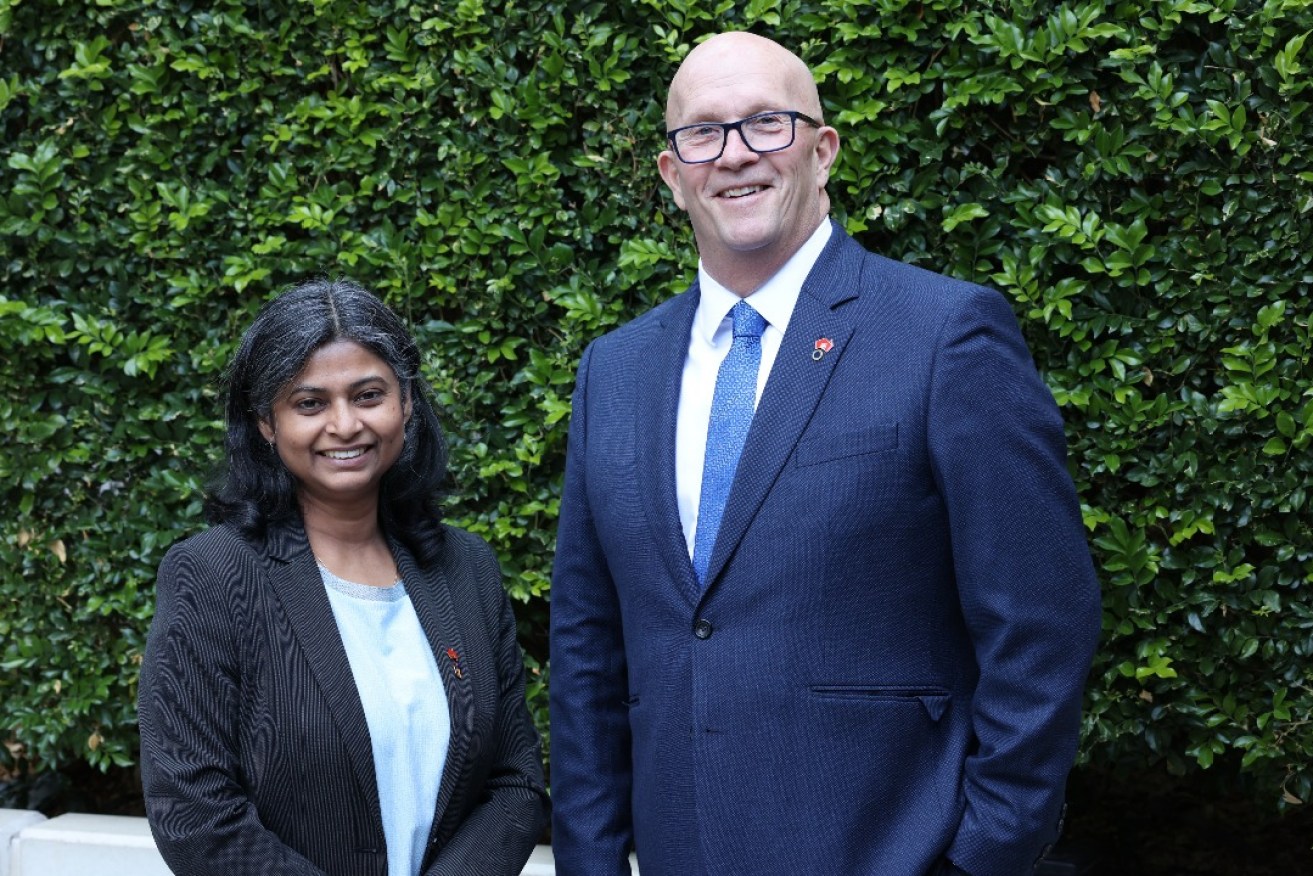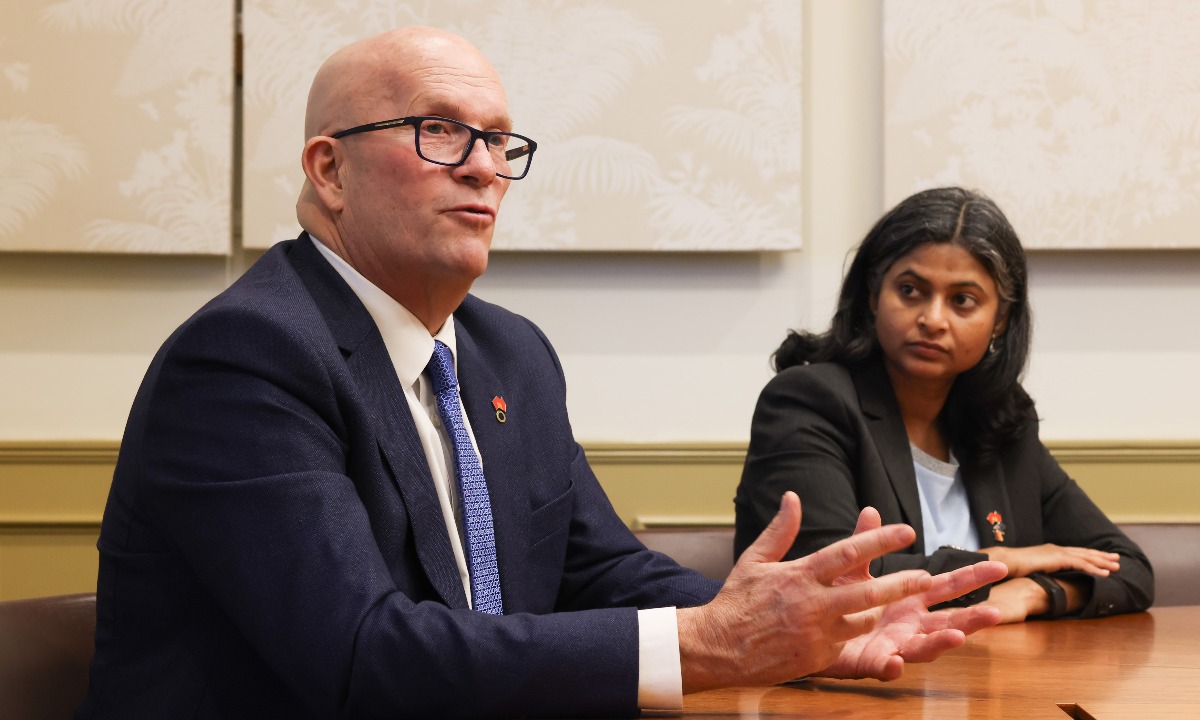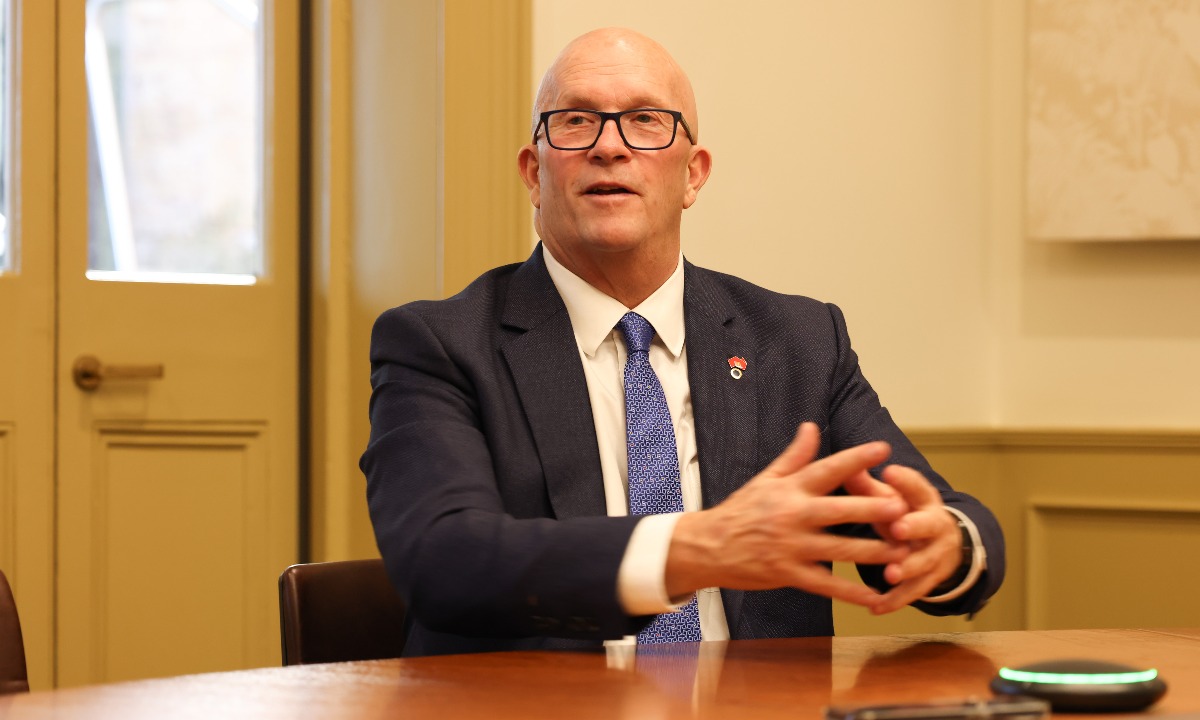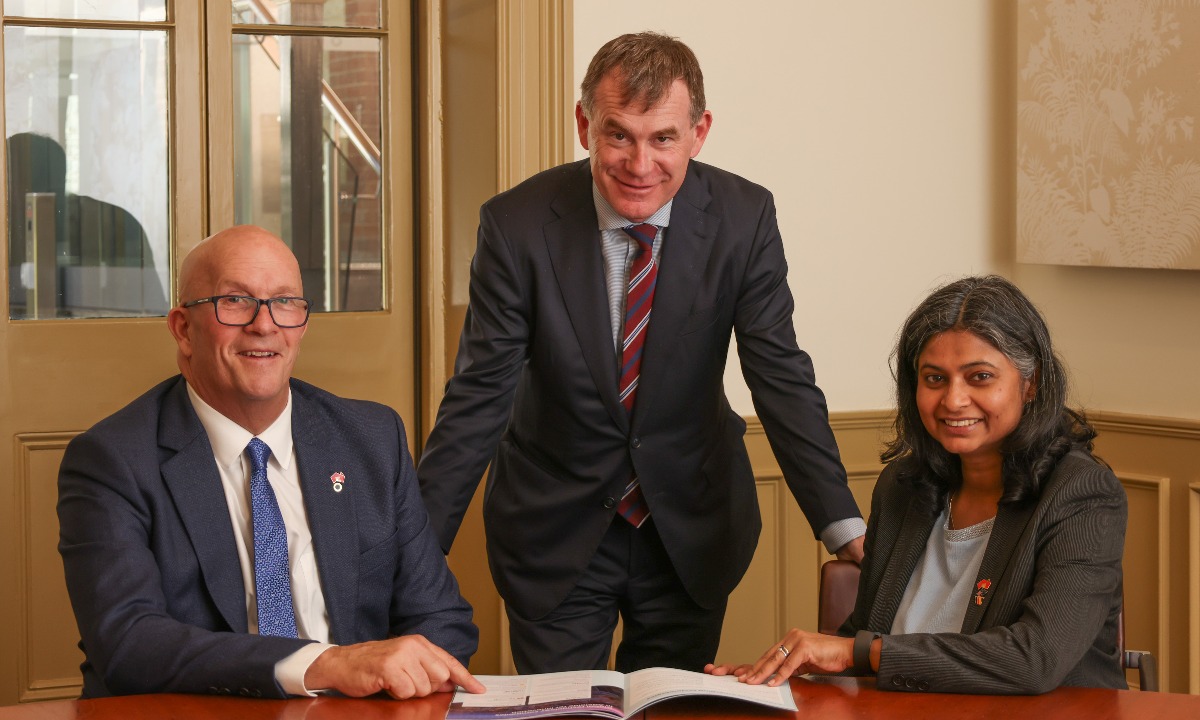Subs, space and science: How South Australian exports can thrive in Europe
In an exclusive sit-down interview with InDaily, the state’s trade and investment representatives in London and Frankfurt laid down the priority areas for South Australian businesses looking to break into Europe.


Pallavi Mishra and David Ridgway. Photo: Tony Lewis/InDaily.
Europe and the United Kingdom are ripe with “tremendous opportunities” for companies specialising in defence, biotech, space and energy according to the South Australian trade and investment representatives promoting the state’s industry overseas.
Speaking to InDaily exclusively, both Agent General David Ridgway – based in London – and newly appointed Frankfurt-based trade and investment manager Pallavi Mishra were optimistic about the export potential for South Australian goods and fresh inventions.
Mishra, who was named trade and investment manager for Europe in October last year, highlighted the “new economic corridor that Germany has with Australia”, and was particularly excited about the potential hydrogen export play to the nation.
“It’s been really interesting getting to learn about new sectors, what are the key focus areas for South Australia when it comes to a German economy and how we are well-positioned to fill some gaps with our offerings through South Australia’s strengths and innovations,” she said.
Ridgway – a former Marshall Government Minister who quit state parliament to take up the role in London – was also excited about the opportunities for South Australia in the UK, particularly via the AUKUS pact and the recently signed Free Trade Agreement between Australia and the former-EU state.
“The nuclear subs are tremendous opportunity; I don’t think we really understand how massive it is,” said Ridgway, who was an MP for nearly 20 years and was Trade and Investment Minister in the Marshall Government.
“Having Pallavi in Germany is great for us because it takes a bit of the pressure off, because Germany is the biggest economy in Europe and there are a lot of good opportunities there.”
Mishra, formerly the German-based representative for India’s business and industry advocacy arm FICCI, said regional conflicts in Europe would have a silver lining for South Australia’s developing hydrogen export industry.
“We all know the regional conflicts that’s going on in Europe, that has accelerated the pace with which countries are looking at their energy transition – especially given Germany has set itself a target to become net-zero by the year 2045,” Mishra said.
“Given the German economy is so dependent upon its industry – it’s the world’s third largest economy – and energy-intensive industries such as the steel industry are looking at renewable energy like green hydrogen.
“They are looking towards importing some huge amounts of it from countries like Australia, and South Australia is very well positioned. The amount of renewable energy that we produce here is incredible, and I really think that’s a fantastic opportunity; the timing is perfect for us.”
Ridgway pointed to a State Government-led pre-feasibility study that looked into a potential hydrogen supply chain between South Australia and the Port of Rotterdam in the Netherlands. It found that Rotterdam would be ready to receive, store and process hydrogen carriers at a “multitude” of shipping terminals and that such a project would be “feasible and has great potential”.
“Now it’s a matter of getting some offtake customers: people that actually want to buy the hydrogen,” Ridgway said.
“It’s big investments that we know the government is very supportive of in the Upper Spence Gulf, so our role is to demonstrate that it’s possible to get it to Europe.
“The German economy does want to decarbonise and hydrogen is certainly one of the ways forward, and we expect over time that we’ll see some great opportunities emerge.”
Space
Mishra said the European space sector had its eyes on Australia. With abundant land upon which to build launch sites and testing centres compared to Europe, South Australia was identified as a state that could play a major role for European companies.
“The market of space-enabled services is expected to grow at about 7 per cent per annum until the year 2040 – and with our companies and capabilities here in South Australia we are very well positioned to balance those gaps,” she said.
“There aren’t enough launch sites available in the European Union, and if there are then the waiting period is just extraordinary. No startup or company can afford to wait so long to be able to launch their satellites or rockets, and we are excellently positioned to offer that.”
Minister for Trade and Investment Nick Champion agreed, and said the conflicts in central Europe “highlighted energy concerns”.
“That marches hand-in-hand with decarbonisation, and there’s only a limited number of ways of dealing with that and hydrogen is a big part of that,” Champion said.

David Ridgway and Pallavi Mishra. Photo: Tony Lewis/InDaily.
Free trade
Effective as of May last year, the Australia-United Kingdom Free Trade Agreement removed the bulk of tariffs on Australian goods exported to the UK, including wine, honey, seafood, processed foods and more.
It opens up plenty of opportunities for Australian exporters according to Ridgway, who said the UK has demonstrated its interest in some of South Australia’s “more niche products”.
“A good example I’ve noticed recently, Haigh’s have announced that they’re going to build their new factory in Salisbury South,” he said.
“They have never exported chocolates because they had milk products in them and are banned under EU rules, and their existing facility is not export accredited.
“The new one will be export accredited and will be much bigger. So it’s a chance for us to take that product – and it’s a pretty easy product to take into market.”
He said with the FTA, SA businesses could “invest with confidence, knowing that at least the trade barriers are not there”.
“Sure, the product has to be good enough to sell there, but the UK had been in the EU since the early-70s, so this is 50 years they’ve been locked out of the market. So there’s opportunities there,” Ridgway said.
“Some of the traditional wine markets – there’s more and more of that being sold both in the UK and Europe. The UK is one of our biggest European markets for wine.
“You have to understand that France, Spain, Portugal, Italy: they produce a fair bit of wine, so it’s a very competitive market, and their producers are just as eager to sell their product as our producers are.”

SA’s Agent General David Ridgway. Photo: Tony Lewis/InDaily.
AUKUS
Another opportunity is through AUKUS. The alliance between Australia, the United Kingdom and the United States is expected to deliver for the defence industry, particularly in South Australia with the planned build of nuclear submarines at Osborne.
“We are in constant contact with over 100 companies in the supply chain for the Astute class submarine that are all interested in developments that are happening with the nuclear submarine program here and over the next few years we hope to get all of those companies to visit here to start looking at how they might invest or form joint ventures or build new facilities,” Ridgway said.
“There’s some particularly good interest, but that defence procurement program is so long and slow, so we won’t see them all here next week. But there’s a lot of them that we’re having conversations with who are very interested in what’s on offer in South Australia.”
Minister Champion said the AUKUS opportunity was “significant”.
“There’s going to be significant work around submarines, but there’s also AUKUS Stream Two, which is cyber and a whole range of emerging defence capabilities, that’s obviously an area of importance,” he said.

David Ridgway, Trade and Investment Minister Nick Champion and Pallavi Mishra. Photo: Tony Lewis/InDaily.
The SA challenge
Though the pair are making headway in promoting our top goods and services, Ridgway said there was a major hurdle he often has to overcome when meeting potential buyers.
“We need to do a lot of work to educate people where South Australia is,” he said.
“Everybody’s heard of Sydney Harbour Bridge, Uluru, and Melbourne because of the cricket – but a lot of them have not heard of Adelaide, so that’s part of the challenge.
“I’m very keen to make sure that we start pushing the message more and more succinctly as to what is South Australia and what are the offerings for it because we do assume: we love it so everybody should. That’s always a bit of a challenge.”
He added that South Australian exporters could brush up in a few respects: locking in export accreditation and “do your research on labelling”.
“I’d say to a producer, if you think your product is good enough, then make sure you’ve got export-accredited production facilities,” he said.




